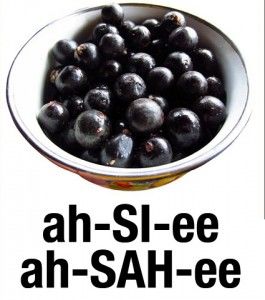Acai and other pesky pronunciation issues

Problems with pronunciation come up very often when you are sitting in a restaurant or need to find something at a store – all the strange exotic words for food that you cannot pronounce you really like. You would love to order some gnocchi if only you knew the correct pronunciation!
To stop the embarrassing habit of pointing at the menu and saying
“I’ll take that,” try learning the proper pronunciation of dishes like moussaka and Worcestershire sauce.
Many of the difficult culinary words come from a language other than English and are full of noises that don’t naturally occur in the English language. But they are a part of everyday English usage.
Proper Pronunciation of Some of Those Culinary Delights.
 Acai [ah-SI-ee] or [ah-SAH-ee] This highly nutritious berry, native to tropical regions of Central and South America, recently gained popularity as a “superfood.”
Acai [ah-SI-ee] or [ah-SAH-ee] This highly nutritious berry, native to tropical regions of Central and South America, recently gained popularity as a “superfood.”- Caramel [KEHR-ah-mehl] or [KAR-ah-mehl] The “ah” sound is important. It is not [KAR-mehl].
- Cognac [KON-yack] A very fine brandy
- Fajitas [fah-HEE-tahs] The ‘J’ is silent
- Filet or Fillet [fill-AY] No need to say “fee.”
- Gyro [YEER-oh] That’s the Greek pronunciation, but it’s also OK to say [JEER-oh]. Just don’t pronounce it like “hero” or put a “guy” in the first syllable.
- Lychee [LEE-chee] A lightly sweet Chinese fruit.
- Moussaka [MOO-sah-kah] A Greek layered dish with eggplant and ground meat
- Quinoa [KEEN-wah] The pronunciation of this grain’s name is a puzzler, but there is no “kwin” sound.
- Salmon I=[SAM-uhn] The ‘L’ is silent in the name of this fish
- And last but not least – there is this brand name that confuses everyone!
Worcestershire [WOOS-tuhr-shuhr] or [WOOS-tuhr-sheer] A bottled condiment named after Worcester, England.

it is NOT ‘carmel’

So you see how you say acai!

queen of superfoods

not ‘wooster’, although everyone will know what you mean …



















